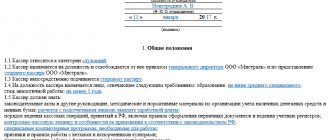General provisions
The instructions establish qualification requirements for the profession of “accountant-cashier”. Duties, rights and responsibilities flow directly from it.
The accountant-cashier belongs to the “Accounting” structural unit. The profession is classified according to the “Qualification Directory of Positions of Managers, Specialists and Other Employees” in the category of service specialists.
General director, chief accountant, senior accountant-cashier - persons to whom the accountant-cashier directly reports.
An accountant-cashier is hired and subject to dismissal on the basis of a personnel (personnel) order signed by the general director on the recommendation of the financial director.
The accountant-cashier transfers responsibilities in full for the period of his temporary absence (vacation, business trip, illness) to another official.
Plan for compiling the document and its authors
The standard labor instructions include the following provisions:
- statement of requirements for the level of competence of the applicant;
- subordination in production;
- formulation of the responsibilities of the future employee;
- a list of documents that will need to be dealt with;
- enumeration of rights;
- responsibilities of the employee, control over his activities.
Usually by drawing up documents such as the job description of an accountant-cashier
, is dealt with
by the immediate head of the department
, in consultation with the company’s lawyer or an external specialist involved. As an option, a standard document is proposed, a standard instruction, to which you can add any nuances of a particular organization, working conditions, special responsibilities and additional rights.
If a person is hired to work in the accounting department, it is necessary to carefully study all the job descriptions of this department
. One of the accepted accountants is appointed to the position of part-time cashier. This is a technical performer who will be hired or released from work by order of the manager, to whom he will be introduced by the chief accountant.
Regulations
The profession of an accountant-cashier implies that a specialist must be guided by the following documents:
- Federal laws, laws of the constituent entities of the Federation in the field of cash transactions;
- resolutions, decrees, decisions of government bodies;
- local regulations in force in the company.
What you should know
When performing his duties, the accountant-cashier is obliged to observe and know:
- instructions, regulations, other materials and documents regulating the maintenance of cash accounting;
- forms of primary documents drawn up when recording cash transactions, primary banking documents;
- basic requirements for the rules for receiving, storing, accounting and spending cash, securities and financial statements;
- the procedure for preparing pay slips, cash receipts and debit orders, including using a computer;
- cash balance limits established for the company;
- the procedure for maintaining and filling out a cash book, preparing daily cash reports;
- regulations on your unit;
- employment contract;
- computer programs for accounting and cash accounting;
- basics of effective labor organization;
- rules for the safe operation of office equipment;
- basic provisions and requirements of labor protection;
- regulations on the company's labor regulations;
- rules of business communication and business etiquette.
JOB RESPONSIBILITIES OF AN EMPLOYEE
3.1. Carrying out work related to property accounting, as well as obligations and business transactions, which include diverse methods - accounting for fixed assets, inventory, sales of finished products, settlements with counterparties, etc.
3.2. Carrying out operations for issuing, accounting, receiving, as well as storing funds and securities with the obligatory condition of maintaining the integrity and safety of entrusted valuables.
3.3. Participation in work to optimize accounting activities, maintain financial discipline, as well as optimal use of enterprise resources.
3.4. Acceptance of primary accounting documentation, followed by accounting processing for compliance with the provided indicators.
3.5. Compliance with the rules for receiving, storing, issuing and accounting for funds and especially valuable securities.
3.6. Receives, in accordance with general and special regulations, funds that are intended to be issued as wages to employees of the enterprise; to pay travel expenses; payment of bonuses and other expenses provided for by the special regulations of the enterprise.
3.7. Conducts data reconciliation based on existing PKO and RKO, with entering data into the cash book, reconciling the information provided in financial documents; reconciliation of the physical presence of the balance of cash and securities, according to the operator’s journal.
3.8. Transfer of funds according to the established scheme to collectors.
3.9. Recording data on accounting accounts for transactions related to the movement of fixed assets, inventory and cash.
3.10. Accrues and transfers taxes and fees to the federal, regional and local budgets, insurance contributions to state extra-budgetary social funds, payments to banking institutions, funds to finance capital investments, wages of workers and employees, other payments and payments, as well as deductions for material incentives for employees of the organization.
3.11. Providing all interested parties (creditors, investors, company managers, auditors and other interested parties) with information on reliable accounting in the framework of professional activities at the enterprise.
3.12. Development of work plans, primary documents that are used to conduct business activities, but do not have standard forms of documentation; development of documentation for internal accounting; participation in determining the content of basic techniques and methods of accounting and technology for processing accounting information.
3.13. Participation in the economic analysis of accounting for enterprise expenses, to identify resources and steps that affect the saving of resources and other business operations; saving economic resources within the limits of their duties; introduction of progressive methods of accounting at the enterprise.
3.14. Preparation of data on sites for the preparation of general accounting reports; monitoring the safety of accounting documents; preparation of documents for transfer to the archive.
3.15. Performs work on the formation, maintenance and storage of a database of accounting information, makes changes to reference and regulatory information used in data processing.
3.16. participation in practical activities using progressive and innovative solutions, which include the introduction of new electronic systems for control and accounting of bookkeeping; practical assistance in implementing economically sound systems for processing economic information.
3.17. ________________________________________________________________.
(other duties)
Goals and objectives of the work
The work of an accountant-cashier pursues the following goals and objectives:
- Timely accounting and control of the legality of the receipt of funds to the current account and the company's cash desk, control of the safety of cash, securities, as well as BSO.
- Timely accounting and control of the legality of spending funds transferred from the company’s current account and issued from the cash register.
- Timely maintenance of cash accounting documents in accordance with the Procedure for conducting cash transactions (hereinafter referred to as the Procedure);
- Timely and complete management of cash accounting operations in accordance with the requirements of the Procedure;
- Interaction with the tax inspectorate, branches of the Pension Fund, extra-budgetary funds, credit organizations, suppliers and contractors, and other structural divisions of the company.
Principles for writing a job description
The current legislation does not have established requirements for the preparation of job descriptions. This situation gives scope for employers to compile sections of the document based on their needs. In practice, employers use standard instructions, modifying them in accordance with the specifics of the company's activities. The instructions include 4 basic sections that specify the main areas of the specialist’s work:
- General section.
- Functions.
- Responsibility.
- Rights.
Large employers can add additional sections to these sections when certain points need to be spelled out more clearly. Thus, some instructions separately add sections about working conditions, job relationships, qualification requirements and conditions for assessing the quality of a specialist.
Requirements for employees can be prescribed based on the relevant professional standard, the procedure for application of which is defined in Article 195.3 of the Labor Code. Also, Article 57 of the Labor Code directly states that the qualification requirements for employees should be determined on the basis of the relevant professional standard. But such a requirement applies only to those jobs where employees are provided with special benefits and compensation, or restrictions are imposed on them. Otherwise, the employer can independently prescribe requirements for employees.
General section
A basic section dedicated to describing the main aspects of working interaction. Here they state the requirements for the candidate’s qualifications, the skills expected of him, who will replace him during his absence, and similar points. The main thing in this section is the list of skills that are required from a specialist. These skills must be consistent with his job responsibilities.
In small organizations, cashier duties can be performed by a full-time accountant. To do this, a corresponding agreement is concluded with a specialist, according to which, for an additional fee, the accountant also takes on the functions of a cashier.
Functions
Here is a brief description of the work assigned to the specialist. It is important not to overload a specialist with secondary responsibilities, which may interfere with his ability to perform basic functions.
Responsibility
The section provides a general list of grounds for holding an employee accountable. Specific types of punishments are not described here, since the degree of guilt is determined only during the relevant proceedings.
Rights
The section provides a list of specialist rights. These rights are standard, but the employer may add additional opportunities for the accountant-cashier. So, you can delegate to him the right to attract other employees of the company to solve his problems.
Working conditions
One of those sections that are included in the instructions at the request of the employer. Its separate inclusion makes sense if the employer provides additional benefits, such as tuition or the provision of branded workwear.
After writing the document, its content must be agreed upon with the company management. Next, the DI is printed on letterhead. At the final stage, signatures are placed. The job description is signed by the hired specialist himself, the director of the company, as well as, if necessary, other persons with whom the appointment was agreed upon. There is no need to put the company seal in the DI.
Functions of an accountant-cashier
- Timely and in full registers the receipt of cash to the company's cash desk.
- Spends the company's cash to accountable persons according to internal memos certified by the signature of the general (financial) director.
- Monitors compliance with the cash balance limit established in the company by daily counting of funds.
- Every day he deposits the accumulated earnings of the day to the bank.
- Receives cash from the bank.
- Fills out the cash book daily and prepares cash documents based on the Procedure.
- Conducts settlements with accountable persons for amounts issued, prepares advance reports, checks the completeness and accuracy of supporting documents attached to advance reports by accountable persons.
- Issues wages to company employees who have not yet issued bank cards for payroll.
- Prepares payment orders and sends them to the bank using the “bank-client” system.
- Daily sums up the transactions for the current day, calculates the balance of funds in the cash register at the end of the current day, submits a tear-off sheet (a duplicate of the entries in the cash book for the current day) to the chief accountant, and attaches cash receipts and debit orders.
- If a vacation is planned, the accountant-cashier transfers responsibilities to another accountant by order issued by the general director.
- Takes part in conducting planned annual and unscheduled inventories, carries out reconciliation with the tax office, branches of the Pension Fund, extra-budgetary funds, as well as suppliers and contractors of the company.
- The accountant-cashier, being a financially responsible person, is obliged to familiarize himself with the Procedure against receipt and sign an agreement on full individual financial responsibility.
- Ensures the safety of primary cash documents for all transactions performed.
- Ensures the safety of funds and documents, cash register.
- Periodically improves her qualifications at seminars and courses on accounting.
- If the accountant-cashier cannot perform the work for good reasons (sick leave), his duties are assigned to another authorized person.
Requirements for a candidate for the position
This specialist must have the following personal qualities
: punctuality, honesty, responsibility, self-control, accuracy, conscientiousness, patience, perseverance, good memory, stress resistance, attentiveness.
Requirements for it
: ability to work with numbers, ability to generalize and analyze, readiness for many similar operations, computer skills and professional programs, knowledge of regulations and laws regarding his work.
If you have not yet registered an organization, then the easiest way is
This can be done using online services that will help you generate all the necessary documents for free: If you already have an organization and you are thinking about how to simplify and automate accounting and reporting, then the following online services will come to the rescue and will completely replace an accountant at your enterprise and will save a lot of money and time.
All reporting is generated automatically, signed electronically and sent automatically online. It is ideal for individual entrepreneurs or LLCs on the simplified tax system, UTII, PSN, TS, OSNO. Everything happens in a few clicks, without queues and stress. Try it and you will be surprised
how easy it has become!
Rights
The accountant-cashier has the following rights:
- Make independent decisions and draw conclusions within your competence.
- Make necessary requests to managers and employees of departments personally or on behalf of the General Director and Chief Accountant in order to fully fulfill their functional responsibilities.
- Receive and process information, including that constituting a trade secret, to the extent necessary to perform its functions.
- Make suggestions for improving work related to the responsibilities defined in the job description. Within the scope of his competence, inform the chief accountant of all comments and shortcomings discovered during his work, and make recommendations for their elimination.
- Require senior management to assist in the performance of their duties within the scope of this instruction.
Responsibility of the accountant-cashier
Responsible:
- For failure to comply with current regulations, orders and directives to ensure the safety of commercial and other confidential secrets protected by law, including personal data.
- For cases when functional duties are not performed or are performed, but not in a timely manner.
- For violation of the conditions and rules of labor regulations, labor protection, and safety regulations.
- For offenses committed in the course of work, he bears individual responsibility within the limits defined in the current administrative, civil and criminal legislation of the Russian Federation.
- For the safety of valuables in the cash register and for damage caused, both as a result of intentional actions and as a result of careless and negligent attitude towards functional duties - within the limits of the current norms of labor and civil legislation of the Russian Federation.
Where to start
The first section will be devoted to the general provisions of the document. Many texts in office work begin exclusively this way, so “General Provisions” will need to be included in your future instructions.
The following points should be included here:
- what group does the position of accountant-cashier belong to?
- how this specialist is hired and fired;
- who is his immediate superior, who represents him for the position;
- to whom are the responsibilities transferred if the employee is temporarily absent;
- requirements for the applicant’s education and, possibly, his experience.
The future accountant-cashier needs to know how cash transactions are performed and how to work with specialized software. You need to navigate the legislative framework, be familiar with the Charter, internal regulations and collective agreement of the company, know the issued orders and directives of management and act within the limits of the job description.







